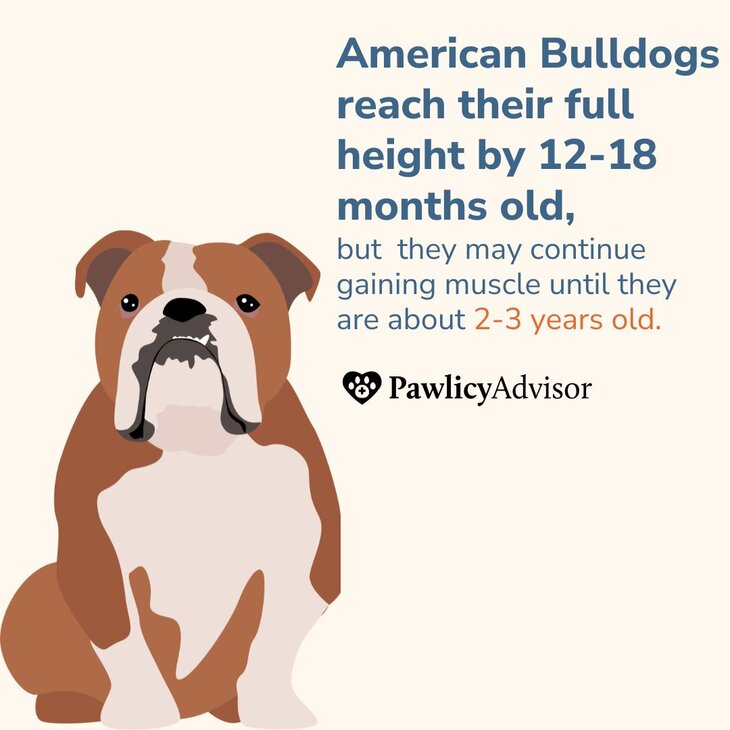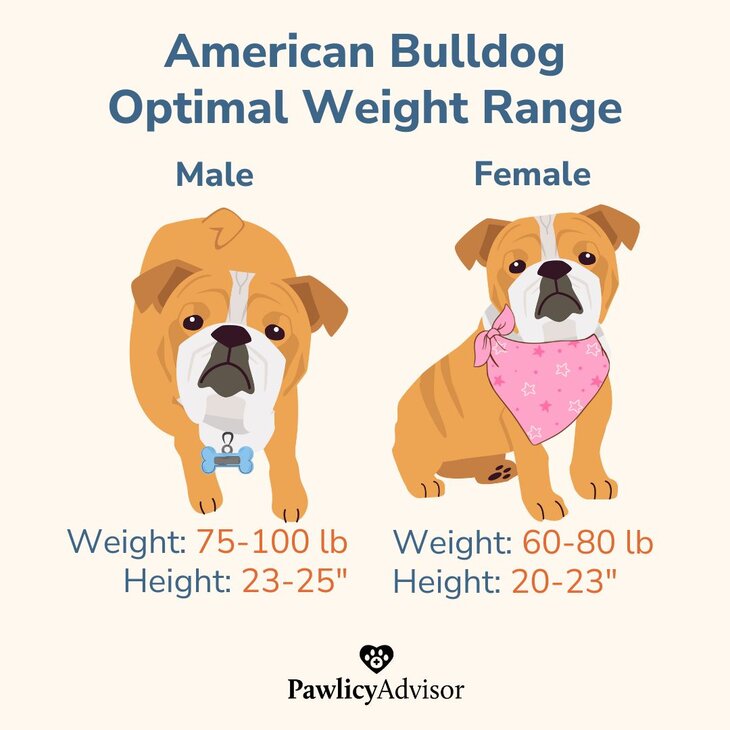American Bulldog Growth & Weight Chart
Despite their formidable appearance, American Bulldogs are gentle giants who are delighted to play with you and the rest of the family. They're loving, clever, and protective, making them ideal family dogs.
If you own an American Bulldog or are considering getting one, understanding the dog's growth and weight is essential in helping you observe its development and identify any issues before they become too severe.
This guide will cover the American Bulldog's growth and weight with essential information about this confident dog breed, including how much to feed a puppy and more.
Your new puppy may be small — but their vet bills won't be.
Save big on costs with pet insurance, so you can protect your puppy while protecting your wallet.
Table of Contents:
American Bulldog Growth & Weight Chart
Male American Bulldog Weights & Heights by Age
| Age (Months) | Weight (lbs) | Height (inches) |
|---|---|---|
| 0 | 5-10 | 8-10 |
| 3 | 20-35 | 12-15 |
| 6 | 40-65 | 16-19 |
| 9 | 50-85 | 18-22 |
| 12 | 60-100 | 20-24 |
| 24-36 | 70-120 | 20-28 |
Female American Bulldog Weights & Heights by Age
Age (Months) | Weight (lbs) | Height (inches) |
|---|---|---|
0 | 5-10 | 8-10 |
3 | 20-35 | 12-15 |
6 | 35-55 | 14-18 |
9 | 45-75 | 16-20 |
12 | 50-85 | 18-22 |
24-36 | 60-100 | 20-26 |
These figures are estimations of how much an American Bulldog weighs. Don't worry whether your puppy is a little behind or ahead; just be sure to take them to the vet regularly to maintain their health and happiness.
When Do American Bulldogs Stop Growing?
American Bulldogs typically achieve their maximum height between 12 and 18 months of age; however, they may keep gaining weight and developing muscle until they are between two and three years old. Individual growth rates might differ, so it's critical to check your puppy's progress often. Your dog's spay/neuter status also determines when he is completely grown.

How Big Should a 6-Month-Old American Bulldog Be?
At six months old, an American Bulldog should weigh between 39 and 64 pounds. These puppies develop quickly! Within a few months, they’ll weigh three times as much as the day they did when they first came home with you.
Females are often at the lower end of this spectrum (and an unusually small-boned female may barely weigh 44 pounds), while males are at the upper end of the scale. If you have a male from a line that produces particularly tall and strong dogs, your 6-month-old male can weigh up to 74 pounds.
It's crucial to avoid overfeeding your dog to accelerate their growth. Genetics dictate size, so giving your dog extra calories won't make them taller—instead, it will only make them overweight.
Ensure your growing pups stay slender to decrease strain on their developing joints and avoid future health complications like diabetes. To determine how much to feed your puppy, consult your local vet and check the measurements outlined on your dog food bag.
Will My American Bulldog Get Bigger?
You can predict how large an American Bulldog will grow in a few different ways. Start by checking the age of your pet first. Your pet has plenty of room to develop if they are younger than two years old! You can also use the size of your dog's paws to determine whether or not they have much more growing to accomplish.
For instance, do their paws appear more prominent than their torso or legs? This characteristic of a classic teenage dog indicates that your puppy is probably still growing!
What is the Optimal Weight for an American Bulldog?
The American Kennel Club provides the following guidelines for mature American Bulldogs:
- Females are 20-23 inches tall and weigh 60-80 Pounds.
- Males are 22-25 inches tall and weigh 75-100 Pounds.
Dogs at the bottom of the height spectrum will weigh less, but tall canines tend to be heavier.1 Your American Bulldog, like any other dog breed, should never be overfed. They should appear muscular rather than "chunky."

How Can I Ensure the Health of my American Bulldog?
The secret to an American Bulldog's prolonged and healthy life is preventive care . It's essential that your Bullie gets adequate exercise and consumes a balanced diet. One of the finest things you can do for your dog's health is to assist them in maintaining an ideal weight.
According to the American Veterinary Medical Association, excess weight can shorten your pet's life by over two years.2 Consult your veterinarian about the appropriate weight for your American Bulldog and any dietary or lifestyle adjustments you can make to support them live a long and healthy life, such as giving them more exercise or a specific diet.
One of the finest things you can do to ensure your American Bulldog is healthy and happy is to take them to regular veterinarian checkups. A qualified veterinarian may examine your pet, offer advice on overall fitness and health, and watch for frequent ailments unique to your pet's breed.
Common Conditions to Look Out For
Obesity is a frequent health issue for American Bulldogs. Their bodies may be subjected to further stress, increasing their vulnerability to various illnesses. The American Bulldog is a brachycephalic breed and tends to overheat more than certain other breeds. It is vital to remember this, as it may affect them during warm weather or when they exercise.
Like many different breeds, they are also susceptible to hip dysplasia, which, if neglected, could potentially result in arthritis. Its symptoms include altered walking patterns and joint stiffness.
Some people can predict the future.For everyone else, there's pet insurance.
Final Thoughts
American Bulldogs are strong, loving, and protective dogs. They are excellent family dogs since they adore kids. These gentle giants need much activity and don't fare well with extended periods of isolation.
When obtaining an American Bulldog, consider your lifestyle because they may exhibit unwanted behavior if they grow bored. Ensure you closely monitor their growth and weight to keep their well-being under close surveillance and see a veterinarian regularly to stop problems before they worsen.
Do you want to find the best pet insurance?
Let's analyze your pet's breed, age, and location to find the right coverage and the best savings. Ready?
Analyze My PetAbout Pawlicy Advisor
The pet insurance marketplace endorsed by veterinarians, at Pawlicy Advisor we make buying the best pet insurance easier. By comparing personalized coverage and pricing differences we can save you a ton of money, up to 83% in some instances!
Instantly Compare Pet Insurance Plans
Guides
Determine If Pet Insurance Is Worth It
Comparison Charts
Find Your State
Dog Insurance
DVM
Ricky Walther, DVM, is a small animal general practitioner in the greater Sacramento, California area. Realizing the positive financial and medical impact that pet insurance can provide for pet parents and the profession, he lends support and advice to companies like Pawlicy Advisor "The Pet Insurance Marketplace") that simplify the process of connecting with veterinary financing resources.
